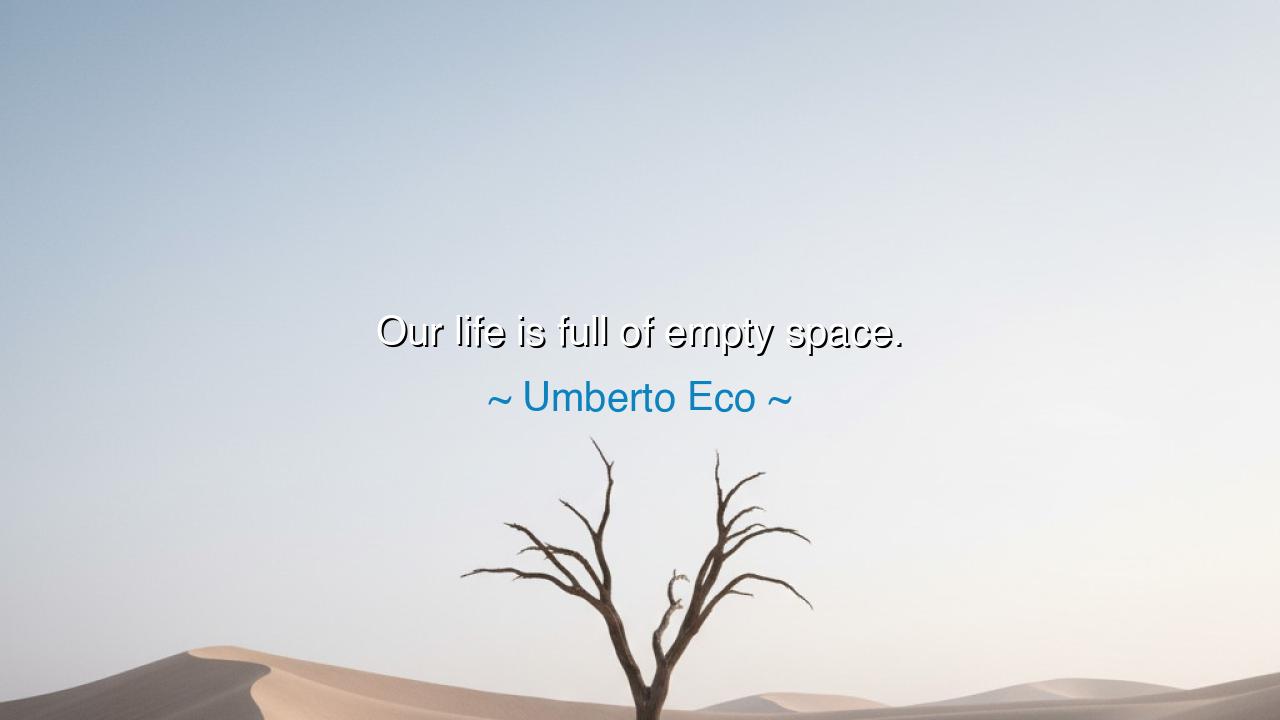
Our life is full of empty space.






Hear, O seekers of wisdom, the words of Umberto Eco: “Our life is full of empty space.” At first, these words seem to carry sorrow, a lament for the void that lingers between our days. Yet upon deeper reflection, they are not a cry of despair but an unveiling of truth: that existence is woven not only of fullness, but also of absence; not only of sound, but also of silence. The ancients, too, knew that the vastness of the cosmos is more void than star, and yet without that space, the stars would have no canvas upon which to shine.
The meaning of empty space in life is not only the hours of waiting, the pauses between great events, but also the unseen stretches where nothing seems to move. We hurry to fill every gap—with noise, with distraction, with endless striving—yet Eco reminds us that emptiness is part of the pattern. Our lives are not solid monuments but airy structures, filled with chambers of quiet, as cathedrals are filled not with stone but with the space between their walls.
History shows us that this emptiness is not weakness but power. Consider the desert fathers of Egypt, who withdrew into the barren sands. The desert was a place of empty space, devoid of comfort and noise. Yet it was in that silence that they discovered the deepest truths of the spirit. Likewise, the samurai of Japan revered not only the stroke of the sword, but the pause before it; the stillness was as essential to mastery as the strike itself. These examples teach us that emptiness, far from being meaningless, is the womb of meaning.
And think also of art and music. The painter leaves space upon the canvas, for too much detail suffocates the eye. The composer inserts rests between notes, for without silence, melody dissolves into chaos. So it is with our lives: the empty spaces—the pauses, the moments of waiting, the days of apparent stillness—give shape and beauty to our existence. Without them, life would be relentless, a storm without calm, a song without rhythm.
Yet the danger is this: in our age, men fear emptiness. They cannot sit in silence, they cannot endure pause, and so they rush to fill every space with distraction. In doing so, they lose the very gift Eco speaks of. For it is in the empty spaces that reflection blooms, that love has room to grow, that wisdom whispers its quiet counsel. To deny emptiness is to deny growth; to fear silence is to flee from the voice of the soul.
The lesson, O listener, is profound: embrace the empty space in your life. Do not despise the waiting, the quiet, the pauses where nothing seems to happen. Instead, see them as fertile ground, as the breath between words, as the stillness that allows the heart to awaken. Fill them not with noise, but with attention—with prayer, with reflection, with simple being.
Therefore, in practice, let each day contain a moment of emptiness. Step away from the clamor of the world, set down your burdens, and sit with silence. Walk without music, eat without distraction, breathe without hurry. In these spaces, you will discover not absence but presence—not void, but the quiet fullness of being alive. And when you return to the world of action, you will act with greater clarity, as the archer who draws strength from stillness before the bowstring is released.






AAdministratorAdministrator
Welcome, honored guests. Please leave a comment, we will respond soon